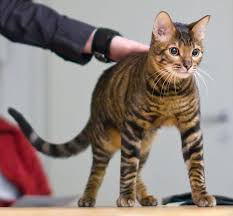An exotic cat breed is a term that is used to refer to any cat breed that is not a domestic cat. Some examples of exotic cat breeds include the Bengal, Savannah, and Chausie.
These breeds are often characterized by their wild or unusual appearance and are typically considered to be more rare or unusual than common domestic cat breeds.
Some exotic cat breeds are also known for their size, with some individuals reaching over 20 pounds. It’s important to note that many exotic cat breeds are not suitable as house pets, as they may have special care requirements or be more prone to health issues.
If you are considering getting an exotic cat, it is very important to do thorough research and ensure that you are able to provide the necessary care and attention for the specific breed you are interested in.
There are many exotic cat breeds that are known for their unique appearances, sizes, and personalities. Some examples of exotic cat breeds are listed for you here in this article, which are:
1. Bengal Cats: These cats are known for their striking coat patterns and are often mistaken for wild cats. They are energetic and social, and are known to be very intelligent and trainable.
2. Savannah Cats: These cats are a hybrid breed, created by crossing a domestic cat with an African serval. They are known for their tall, slender bodies and long legs, as well as their energetic and social personalities.
3. Chausie Cats: These cats are a hybrid breed, created by crossing a domestic cat with a jungle cat. They are known for their athletic builds and large size, and are known to be very active and playful.
4. Siamese Cats: These cats are known for their striking blue eyes and sleek, slender bodies. They are known to be very vocal and intelligent, and are often described as being very social and affectionate.
5. Persian Cats: These cats are known for their long, thick coats and round, chubby faces. They are known to be calm, gentle, and affectionate, and are often described as being very low-maintenance pets.
6. Devon Rex Cats: These cats are known for their unique coat, which is thin, soft, and wavy. They are known to be energetic, playful, and intelligent, and are often described as being very social and affectionate.
7. Sphynx Cats: These cats are known for their lack of fur, which gives them a unique, hairless appearance. They are known to be energetic, playful, and affectionate, and are often described as being very social and outgoing.
Where and How to Find Exotic Cats for Sale

There are many other exotic cat breeds as well, each with its own unique characteristics and traits. If you are considering adopting an exotic cat, it is important to do your research and learn as much as you can about the breed you are interested in to ensure that it is the right fit for you and your family.
According to a thorough research carried out during the course of time and when writing this article, it has been made clear that it is not appropriate or ethical to sell exotic animals including cats as pets.
Exotic animals, such as cats, are often taken from their natural habitats and subjected to inhuman (away from the human environment) conditions during the sale and transportation process.
They may also be difficult to care for properly due to their specialized needs, and may endanger both their owners and the community. In many cases, it is also illegal to own exotic animals as pets.
Read Also: Complete List of Cats That Don’t Shed
Instead of considering the purchase of an exotic animal or cat, you can please consider adopting a domestic pet from a shelter or rescue organization. There are many wonderful animals (cats) in need of loving homes, and adopting a pet can be a rewarding and fulfilling experience.
Exotic cat rescue organizations are dedicated to rescuing, rehabilitating, and rehoming exotic cats that have been neglected, abandoned, or mistreated. These organizations often work with a variety of different kinds of exotic cat species, including lions, tigers, leopards, jaguars, and other large cats.
Many exotic cat rescue organizations are non-profit and rely on donations and volunteers to fund their operations and care for the animals.
In addition, if you are interested in supporting exotic cat rescue efforts and work, there are a few ways you can get involved in their services which are as listed below for you:
1. Donate: Many exotic cat rescue organizations rely on donations to fund their operations and care for the animals. You can make a one-time donation or set up a recurring donation to support their work.
2. Volunteer: Many exotic cat rescue organizations rely on volunteers to help care for the animals, clean enclosures, and perform other tasks. If you are interested in volunteering your time, contact a local rescue organization to see if they have any opportunities available.
3. Adopt: Some exotic cat rescue organizations offer adoption programs for their animals. If you are interested in adopting an exotic cat, contact a rescue organization to learn more about the process and what is involved in caring for an exotic cat.
It is very important to note that exotic cats can require a significant amount of care and attention, and they are not suitable pets for everyone. Before considering adoption, make sure you are prepared to provide the necessary care and resources for an exotic cat.
How to Care For These Exotic Cat Breeds

Exotic cat breeds, such as the Bengal, Savannah, and Chausie, can make great pets but they do require special care and attention. Here are some tips and guidelines for caring for exotic cat breeds:
1. Provide proper housing: Exotic cat breeds need plenty of space to move around and play. It is very important to provide a secure enclosure or room where they can exercise and express their natural behaviors.
2. Feed a high-quality diet: Exotic cat breeds have specific nutritional needs. It is very important to feed them a diet that is appropriate for their age, size, and breed.
3. Keep their nails trimmed: Exotic cat breeds have sharp nails that can be harmful to humans and furniture. It is important to regularly trim their nails to prevent accidental injuries.
4. Provide mental and physical stimulation: Exotic cat breeds are intelligent and active animals that need plenty of mental and physical stimulation to stay healthy and happy. This can include providing toys, puzzles, and playtime, as well as opportunities for exploration and climbing.
5. Visit the vet regularly: It is very important to take exotic cat breeds to the vet for their regular check-ups and to stay up-to-date on their vaccinations. This will help ensure that they remain healthy, happy and in good condition.
Caring for exotic cat breeds requires a commitment to providing them with the proper housing, nutrition, mental and physical stimulation, and medical care they need to thrive.
Read Also : Global Outlook of Wildlife Sector and International Wildlife Tourism
Frequently Asked Questions
We will update this section soon.

